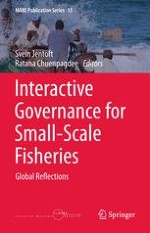2015 | OriginalPaper | Chapter
22. The Governability of Mangrove Ecosystems in Thailand: Comparative Successes of Different Governance Models
Authors : Estelle Jones, Heidi Schuttenberg, Tim Gray, Selina Stead
Published in: Interactive Governance for Small-Scale Fisheries
Publisher: Springer International Publishing
Activate our intelligent search to find suitable subject content or patents.
Select sections of text to find matching patents with Artificial Intelligence. powered by
Select sections of text to find additional relevant content using AI-assisted search. powered by
